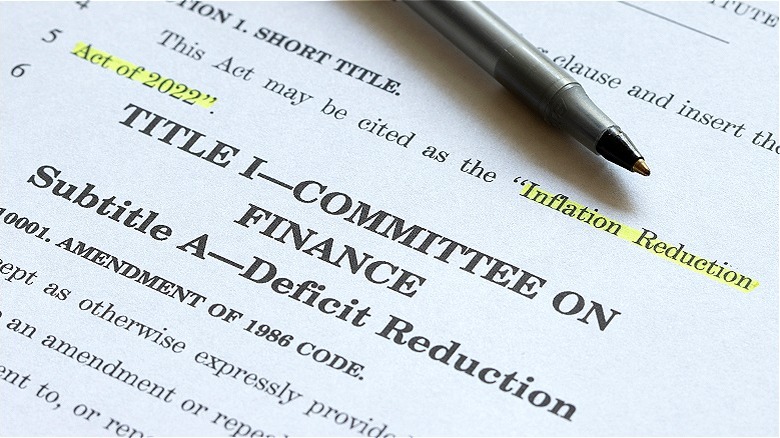What Is A Budget Deficit?
Between budget talks and potential government shutdowns, the term "budget deficit" gets thrown around a lot these days. The easiest way to explain a budget deficit is when more money is going out (aka being spent) than there is money coming in (aka revenue from things like taxes). For instance, as of November 2023, the United States government had spent $381 billion more than it collected in fiscal year 2024, which began October 1, 2023. This equals a $44 billion increase over November 2022.
According to the United States Department of the Treasury, the national deficit for the 2023 fiscal year totaled $1.7 trillion, which is a 23% (or $320 billion) increase over 2022. For most, that number can seem almost incomprehensible, and it's especially concerning when you realize it's a $320 billion increase over the previous year's deficit. While it might sound simple enough that running at a deficit is a negative thing, did you know there can technically be both pros and cons to a government (or company) operating at a deficit?
While debt, in general, isn't exactly something to pursue, there can be benefits to a short-term one, especially when it comes to boosting a stagnant economy. This said, the current U.S. deficit has been a constant since 2002, which has left people concerned about the country's reliance on debt in order to operate. Let's dive into what you need to know about budget deficits.
Pros of a budget deficit
The main thing to consider about any potential positives relating to a budget deficit is how long- or short-term the deficit is. If a government/company ends up with a short-term deficit due to spending and investment for a specific spending project, then the situation is generally seen as a positive one. Whatever industries are involved in the spending investment will more than likely receive a financial and operational boost as a result of the project. Further, depending on the scale of the project and its purpose, it could positively impact many different people's lives.
For instance, implementing a public transportation system in a city without one could help not only reduce traffic congestion, but also save people money on gas, cars, and insurance payments. Plus, the local companies that would help create and build physical items and infrastructure for the program would benefit from the financial investment in the project.
Even with this in mind, not all short-term deficits can be beneficial to the larger economy. A great example is tax cuts for the wealthy or even for corporations. Generally speaking, the money awarded to these groups through lower taxes doesn't enter the regular circulation of the economy, so it doesn't ultimately help to stimulate spending or help most Americans. While it's possible this extra money could influence a corporation to increase employment, there's no guarantee it will. Similarly, offering subsidies to certain industries and/or corporations can, on the surface, help to ensure jobs and pay, but there's again no guarantee, especially when dealing with private corporations.
Cons of a budget deficit
A key to utilizing the positives of budget deficits is to keep them minimized to short terms. This is what makes the current U.S. situation such a problem since long-term deficits can be detrimental to not only economic growth but also overall economic stability. Many of the tactics used to try and recover from a budget deficit can ultimately harm people, businesses, and the economy as a whole. For instance, if the government chooses to cut spending on social programs like Medicare or Social Security, users of these programs will ultimately suffer. Similarly, long-term deficits could push the government to not only not expand existing programs but also avoid creating any new programs and/or services that might be necessary to fill existing gaps.
Along with a lack of investment in social programs is a lack of improvement and maintenance for important infrastructure projects, like public transportation, road and bridge repairs, and even safe pipes for drinking water. Plus, governments and companies might choose to raise taxes and prices as a way to offset their deficits. This can affect the individual through tax increases and higher prices but also through job opportunities. If a government raises taxes on a specific company, that company could choose to hire fewer employees or lay off existing staff in order to maintain profit margins. While the company doesn't have to do this, it's increasingly clear that most corporations will choose profits above all else, even when research has proven the long-term, detrimental effects of layoffs.


